- Director's Welcome
- Thank you to our donors
- IJC Welcomes New Director
- Faculty Updates
- Student Updates
- Student Articles
Director's Welcome
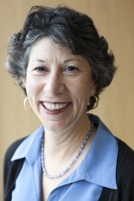 By Marsha Mansfield, Clinical Professor of Law; Director, Economic Justice Institute
By Marsha Mansfield, Clinical Professor of Law; Director, Economic Justice Institute
The UW, Madison selected “Evicted: Poverty and Profit in the American City” by Matthew Desmond for its “Go Big Read” program this past fall. The book, which tells the story of eight Milwaukee families faced with losing their homes, illustrates the economic injustices faced by the EJI’s clients and their families. As the book narrates, the financial instability experienced by so many in our communities can (and often does) lead to a spiraling decline of the family and a sense of pervasive insecurity. And, as the New York Times pointed out in its review of the book, “Eviction itself provides the dramatic punctuation in Desmond’s story.”
Families are traumatized by displacement from their homes. Children shuttle between schools. Parents have trouble keeping their jobs, and the lack of an address may compromise their ability to gain, or hold on to, whatever benefits they are eligible for. Like incarceration, eviction can brand a person for life, making it difficult, if not impossible to rent elsewhere. This is not only true of those who experience eviction, however. The Family Court Clinic seeks to help those whose partners displace them forcibly or through violence; who are forced to leave without their personal belongings or clothing. The Consumer Law Clinic assists those who are the brink of losing their home through foreclosure and other predatory schemes. Losing one’s home can take many configurations.
In an informal Q & A at the Law School, Desmond noted how important having a lawyer can be to these families, but also that that resource is scant in our communities. People simply avoid going to court for a variety of reasons: fear, ignorance, or expense, and the consequences are significant. The statutory rules and how the law is actually applied in the courtroom can seem unrelated and incomprehensible. Desmond understands that enforcing those rules that may actually help these families is simply unaffordable and unattainable for most litigants.
Against this background The EJI students take on landlords, opposing spouses, banks, and the justice system. They work tireless to battle evictions, to help their clients obtain financial security, maintain their residency in the United States, or secure a settlement for a client wrongfully displaced from his or her home. They provide a legal safety net that is largely missing from our justice system. They also learn so much while doing so. Their stories and their educational experiences that contained in this newsletter clearly reflect the impact the clinic has on them as they move through law school and become a part of the legal profession; a profession that has as its calling, “the responsibility to ensure equal access to our system of justice for all those who because of economic or social barriers cannot afford to secure adequate legal counsel.”
Thank you.
Thank you to our Donors
We thank those of you who have generously supported the Economic Justice Institute's mission through the end of September. We ask all of you now to join us in supporting our professional responsibility and the education of the next generation of lawyers. Our work would not be possible without your generous support.
Support the EJI and the work we do by donating here or by calling 800-443-6162.
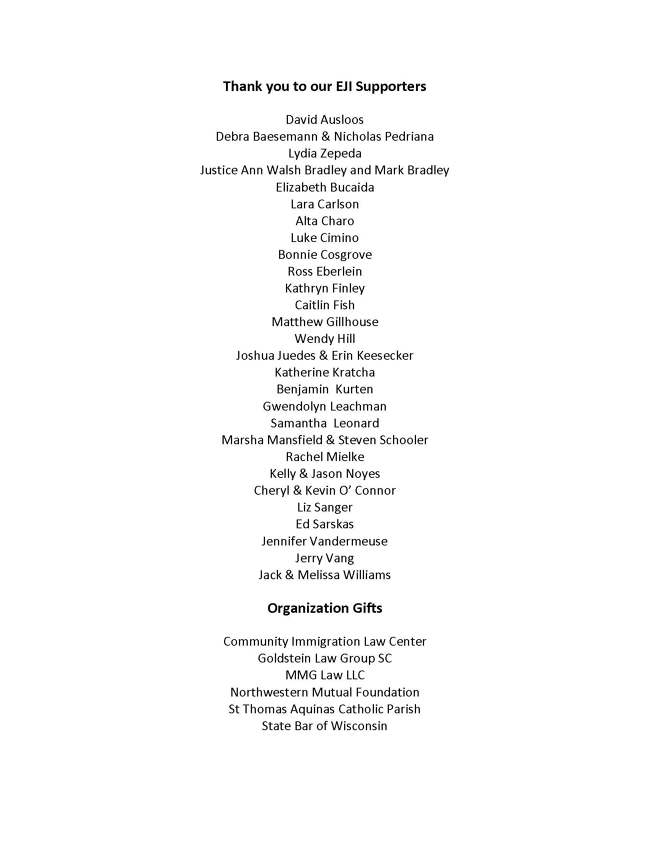
Clinical Staff Updates
Immigrant Justice Clinic Welcomes New Director
We at EJI are excited to introduce you to Ben Harville, our new Director of the Immigrant Justice Clinic. We asked Ben to tell you a little about himself. Here goes:
I am delighted to join the Economic Justice Institute as a clinical instructor and director of the Immigrant Justice Clinic. I love being an immigration attorney, and I am confident that this joy will rub off on the law students who participate in the IJC. Furthermore, as a native Wisconsinite, I am proud to be a part of this great University and Law School. I went to high school in the Madison area. I received a Bachelor’s degree in Spanish from the University of Wisconsin-Whitewater and a Master’s Degree in Latin American Studies from the University of Wisconsin-Madison. After graduate school, I spent almost ten years living in Arizona. I graduated from the University of Arizona’s James E. Rogers College of Law in 2012. From 2012 to 2016, I was a Staff Attorney for the Florence Immigrant and Refugee Rights Project in Florence, Arizona.
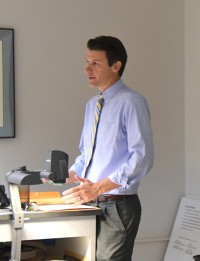 The Florence Project, in Pinal County, Arizona, provides free legal services to people detained by Immigration and Customs Enforcement. At the Florence Project, I provided direct representation to thirty to forty detained non-citizens per year during their immigration removal proceedings. These cases involved family petitions, requests for asylum protection, waivers of deportation, and other issues. I also wrote roughly forty appellate briefs to the Board of Immigration Appeals on a diverse range of issues. The four years I spent working as an immigration attorney in Arizona – often the frontline of the immigration debate - were sometimes joyful, often heartbreaking, but never forgettable. I hope my experience fighting for justice in the borderlands will serve me well as I transition to a new role as mentor and educator.
The Florence Project, in Pinal County, Arizona, provides free legal services to people detained by Immigration and Customs Enforcement. At the Florence Project, I provided direct representation to thirty to forty detained non-citizens per year during their immigration removal proceedings. These cases involved family petitions, requests for asylum protection, waivers of deportation, and other issues. I also wrote roughly forty appellate briefs to the Board of Immigration Appeals on a diverse range of issues. The four years I spent working as an immigration attorney in Arizona – often the frontline of the immigration debate - were sometimes joyful, often heartbreaking, but never forgettable. I hope my experience fighting for justice in the borderlands will serve me well as I transition to a new role as mentor and educator.
Immigration continues to be a highly controversial issue in the United States. I hope to provide my students with a nuanced view of the immigration debate and instill an appreciation of the difficulties non-citizens face as they attempt to gain legal status in the United States. The Immigrant Justice Clinic represents clients in immigration proceedings before the Immigration Court, the Board of Immigration Appeals, and United States Citizenship and Immigration Services (USCIS). The clinic's primary focus is on advocating for individuals who are fleeing persecution in their homelands and are seeking asylum in the US, individuals who have been the victims of domestic violence or other crimes, and individuals in immigration detention. The clinic students regularly visit immigration detainees in a nearby jail to provide "know your rights" information and conduct intakes. The matters handled by the clinic allow students to develop core lawyering skills, such as interviewing, counseling, fact-investigation, legal research and brief-writing, and trial advocacy. Students often have the opportunity to directly represent clients in immigration court.
My predecessor in this position, Stacy Taeuber, was a brilliant attorney who created and grew the IJC into the valuable clinical program it is today. In May of 2016, Stacy accepted a position as a Staff Attorney in the Immigration Unit at the Legal Aid Society of New York. Although we are grateful that Stacy will continue the important work of fighting for justice for immigrants in her new position, she left behind some awfully big shoes to fill. I hope to build on the foundation she has laid with a particular focus on assisting non-citizens in immigration detention and those currently in deportation proceedings.
Faculty Updates
Ben gave a presentation to the Madison Breakfast Rotary Club on the topic of “Immigration Detention and Stateless People,” on November 7, 2016.
Marsha was appointed as the Reporter for the OLR Procedures Review Committee; a 19-person committee created by the Supreme Court to review and possibly update the procedures that apply to OLR reviews of lawyer grievances.
Marsha is a presenter at the upcoming State Bar Seminar, Ethical Considerations for the Family Law Practitioner on December 15.
In June, Mitch traveled to New Orleans to present his research on access to justice at the Law and Society Association annual meeting.
In September Mitch participated in the Writer's Workshop hosted by the Clinical Law Review at NYU, and in October he presented a free CLE on rental housing law to lawyers volunteering with Legal Action of Wisconsin.
This year the University selected Evicted, by Matthew Desmond, as the “Go Big Read” book and Mitch worked with the Law School's orientation committee to incorporate themes and lessons from the book into the community service day activities. He was also invited to speak about NLC’s rental housing work at the Dean’s Summit on November 11. The Summit is a 2-day event for individuals who have made a significant commitment to the Law School.
Sarah was a co-trainer on the topic of post-judgment collection protections at Legal Action of Wisconsin’s Volunteer Lawyer Project Consumer Protection CLE.
Sarah moderated a well-attended roundtable discussion with Federal Trade Commissioner Terrell McSweeny. The Commissioner described both the challenges of combating fraud in the digital age and the satisfaction of returning millions of dollars to scammed consumers.
Student Updates
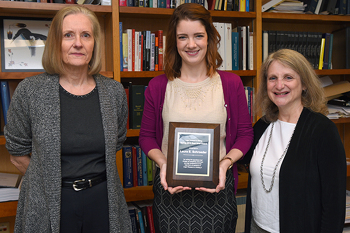 Laura Schroeder, a 2L in the Family Court Clinic, was named the winner of the 2016 Best Brief Competition. The competition, sponsored annually by the Law School's Legal Research and Writing Program, recognizes outstanding legal writing by first-year students. Jonathon Davies, a 2L in the Neighborhood Law Clinic, was the runner up.
Laura Schroeder, a 2L in the Family Court Clinic, was named the winner of the 2016 Best Brief Competition. The competition, sponsored annually by the Law School's Legal Research and Writing Program, recognizes outstanding legal writing by first-year students. Jonathon Davies, a 2L in the Neighborhood Law Clinic, was the runner up.
The Best Brief award involves three rounds of competition. First, Legal Research and Writing faculty select the best appellate briefs written by their students. Next, a panel of Wisconsin lawyers evaluate the semi-finalists’ briefs and choose the finalists. The finalists’ briefs are then judged independently by a panel of law school faculty, who determine the winner. Congratulations Laura!
 Chelsea Fisher (3L) a student in the Family Court Clinic during her 2L year was honored with the 2016 Leonard Loeb Family Law Scholarship by The American Academy of Matrimonial Lawyers (AAML). This is the second year that a student from the FCC won the award. Chelsea was selected for her record of academic excellence and her commitment to the field of family law. She serves as a Student Ambassador for the Law School and is involved in the Women's Law Student Association, Phi Alpha Delta, Wisconsin Law Review, and is on the Executive Board of Moot Court. Congratulations, Chelsea!
Chelsea Fisher (3L) a student in the Family Court Clinic during her 2L year was honored with the 2016 Leonard Loeb Family Law Scholarship by The American Academy of Matrimonial Lawyers (AAML). This is the second year that a student from the FCC won the award. Chelsea was selected for her record of academic excellence and her commitment to the field of family law. She serves as a Student Ambassador for the Law School and is involved in the Women's Law Student Association, Phi Alpha Delta, Wisconsin Law Review, and is on the Executive Board of Moot Court. Congratulations, Chelsea!
The AAML is comprised of the nation’s top attorneys who are experts in the field of matrimonial law. Its purpose is to encourage the study, improve the practice, elevate the standards and advance the cause of matrimonial law, to protect the welfare of the family and society. The $5,000 award honors the memory of Loeb, a 1952 Law School graduate recognized throughout his professional life as a leader in family law and community service.
John Rejowski, as 2L in the Family Court Clinic and Marsha Mansfield, his supervising attorney, were both quoted in a Badger Herald story on October 18 about the interpreter shortage facing Wisconsin courts.
Consumer Law Clinic Students Work on Several Fronts
By Philip Billow, (2L)
The Consumer Law Clinic is active on several fronts in this exciting consumer protection landscape. Our recent experiences advocating in a broader context complement our work representing clients in specific matters.
First, we commented on the Consumer Financial Protection Bureau’s (CFPB) proposed rules to regulate the payday, auto title and installment loan industry across the country. These loans carry interest rates and fee schemes that devastate consumers living from paycheck to paycheck, frequently sending them into a spiral of debt. One of the most important aspects of the CFPB’s proposed rules is a “ability to repay” requirement. The CLC joined a group of legal scholars and a Wisconsin advocacy coalition in pointing out the gaps in the rule and suggesting improvements that could prevent lenders from getting around the ability to repay requirement.
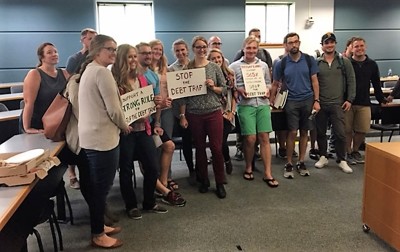 As part of a statewide effort to raise awareness of the CFPB’s proposed rules and the true costs of predatory lending, the CLC hosted a well-attended showing of the documentary “The Ordinance.” The documentary shows faith-based groups in Texas coming together to pass ordinances limiting payday lending in their communities. Similar efforts in Texas and across the country stem from state and federal governments’ failures to meet local consumer protection demands. One student commented on her experience: “I enjoyed seeing a consistently conservative state take action against predatory lending practices. The efforts of historically disparate cultural and political groups uniting under this purpose was inspiring.”
As part of a statewide effort to raise awareness of the CFPB’s proposed rules and the true costs of predatory lending, the CLC hosted a well-attended showing of the documentary “The Ordinance.” The documentary shows faith-based groups in Texas coming together to pass ordinances limiting payday lending in their communities. Similar efforts in Texas and across the country stem from state and federal governments’ failures to meet local consumer protection demands. One student commented on her experience: “I enjoyed seeing a consistently conservative state take action against predatory lending practices. The efforts of historically disparate cultural and political groups uniting under this purpose was inspiring.”
Finally, CLC Director Sarah Orr facilitated a lively roundtable discussion with Federal Trade Commissioner Terrell McSweeny at the Law School. Commissioner McSweeny went into depth about the FTC’s special role and challenges in protecting consumers in the digital age. She talked candidly about the consumer protection environment after the creation of the CFPB and described the fraud schemes that irritate and motivate her the most.
We look forward to more opportunities to speak up for Wisconsin consumers in the spring semester when the state legislature is in session and the CFPB develops rules on mandatory arbitration clauses and debt collection.
Comments on the Journey from Law Student to Lawyer
By Laura Schroeder, (2L)
The first year of law school is mostly taught in the abstract. First year students spend time reading cases and then analyzing them in lecture, attempting to deduce some kind of generally applicable law from the judges’ often garbled language. After trudging their way through two semesters of doctrine and theory, students entering a clinical program are thrown into a very different type of legal education.
During my first week with the Family Court Clinic, I received a big brown file full of information about my assigned case. The file contained memos from the previous clinical student on the case, that student’s notes from meetings with the client, and previous court filings from the in-progress divorce case. The file was heavy and bulky and filled with real-life facts about a real-life client whose interests were now literally in my hands. Being handed a file for the first time was jarring and overwhelming. I felt wholly inadequate to take on that responsibility. All of those hours spent sitting in a lecture talking about torts cases from 19th Century England felt insufficient to prepare me for the first phone call I had to make to introduce myself to a client, or the first letter that I had to write to opposing counsel.
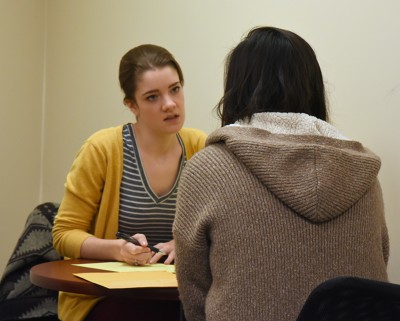 Thankfully, the EJI clinical professors are very familiar with the terrified faces of each year’s new students. The beginning of the clinical experience, which starts about one week after first-year final exams end, involves a lot of preparation, explanation, coaching, and hand-holding. The terror of being responsible for another person’s legal fate abates when students realize that their supervising attorneys are incredibly useful resources who also care very much about the outcome of their students’ cases. These professors are tasked with educating very inexperienced law students in a deeply immersive experience, and they are well-equipped to handle that task. They waste no time in throwing students into the experience wholeheartedly. They teach by pointing to the appropriate resources for answers, not by telling their students what those answers are. They monitor, revise and oversee, but they allow students to learn through the experience of researching statutes, drafting motions, and counseling clients. They counsel the students themselves in weekly meetings meant to evaluate case progress and allow individual reflection.
Thankfully, the EJI clinical professors are very familiar with the terrified faces of each year’s new students. The beginning of the clinical experience, which starts about one week after first-year final exams end, involves a lot of preparation, explanation, coaching, and hand-holding. The terror of being responsible for another person’s legal fate abates when students realize that their supervising attorneys are incredibly useful resources who also care very much about the outcome of their students’ cases. These professors are tasked with educating very inexperienced law students in a deeply immersive experience, and they are well-equipped to handle that task. They waste no time in throwing students into the experience wholeheartedly. They teach by pointing to the appropriate resources for answers, not by telling their students what those answers are. They monitor, revise and oversee, but they allow students to learn through the experience of researching statutes, drafting motions, and counseling clients. They counsel the students themselves in weekly meetings meant to evaluate case progress and allow individual reflection.
The first thirteen weeks of the clinical experience take place over the summer. Students work full-time, getting to know each other, their supervisors, and their clients. They quickly grow accustomed to a 9-to-5 schedule. Those thirteen weeks fly by, and students soon find themselves facing the fall semester of their second year. After a summer of gaining practical, hands-on knowledge, students are given a new task: learning to balance everything that was learned over the summer with being a full-time student again. Juggling the responsibilities of maintaining client cases and finding the time to read and prepare for traditional law school classes is a brand new hurdle that arises right when clinical students are comfortable with being a full-time clinical student. It’s a challenge that I have yet to master, but I believe that learning how to find that balance is as important as learning the law. It’s a part of the clinical education, and it will make the students who participate in it better attorneys in the future.
It is widely known that law school is a challenging endeavor that leaves many of its graduates with a lot of knowledge but few practical tools to enter the practice of law. I feel very fortunate to have a clinical experience on my résumé, as it has bridged the gap between education and practice much sooner than a traditional academic program would. I know that I still have a lot to learn, and that learning will never cease throughout my career as an attorney.
Making a Difference by Reuniting Families
By Daniela I. Hernandez, (2L)
Every month, the Immigrant Justice Clinic (IJC) students visit the Dodge Detention Facility in Juneau, WI. This year’s new clinical cohort, along with volunteers and our new supervising attorney, Ben Harville, made our first visit to Dodge this past June. For many of us, it was our first time inside a detention facility, and for me personally, the experience awoke new emotions within me, that continue with each visit.
During our four-hour visit, we complete intakes with detainees which we later assess to determine whether the IJC can take their case. We have made four trips to Dodge for intakes so far, and between all the IJC students, volunteers, and Ben, we see about 40-50 detainees each day. At each visit, we come across men and women who share their heart-wrenching and compelling stories that leave us not only in awe, but also very eager and determined to advocate on their behalf.
We met one of these individuals during our second trip in July; an 18-year-old girl from El Salvador named Vanessa (not her real name). At the age of seventeen, Vanessa fled El Salvador to be with her mother who was living in the state of Maryland. Apprehended at the border as an unaccompanied minor, she was taken to an Office of Refugee Resettlement (ORR) shelter in Chicago where she stayed for almost two months. The ORR contacted Vanessa’s mother, Maribel, and began the procedure to release Vanessa to her. Unfortunately, all the necessary paperwork was not completed on time. On the day of Vanessa’s eighteenth birthday – when most young women are preparing for their senior year of high school - she was picked up from the ORR by Immigration and Customs Enforcement and transported to adult detention at Dodge.
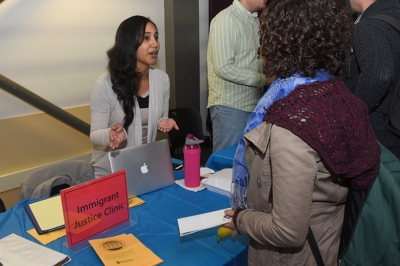 I did not meet Vanessa during our July visit, but when Ben informed me of her situation, I was ready to begin working. We concluded she was eligible to be released from detention by paying a bond, so our first objective was to represent her in a bond hearing. For two weeks straight, I was in constant contact with Maribel and Vanessa’s sponsor, to make sure that they submitted the appropriate supporting documents for us to present to the immigration judge. This included letters of support from family, friends, and members of the community that Vanessa would soon call home. During this time I also contacted numerous nonprofits in Maryland in order to find an immigration attorney who would be able to assist Vanessa once she was released. After receiving the letters from Maribel, I submitted them with my motion to schedule a bond hearing, in which I detailed the reasons Vanessa presented no risk of flight nor any danger to the community.
I did not meet Vanessa during our July visit, but when Ben informed me of her situation, I was ready to begin working. We concluded she was eligible to be released from detention by paying a bond, so our first objective was to represent her in a bond hearing. For two weeks straight, I was in constant contact with Maribel and Vanessa’s sponsor, to make sure that they submitted the appropriate supporting documents for us to present to the immigration judge. This included letters of support from family, friends, and members of the community that Vanessa would soon call home. During this time I also contacted numerous nonprofits in Maryland in order to find an immigration attorney who would be able to assist Vanessa once she was released. After receiving the letters from Maribel, I submitted them with my motion to schedule a bond hearing, in which I detailed the reasons Vanessa presented no risk of flight nor any danger to the community.
My motion was approved by the immigration judge and a bond hearing was scheduled. Shortly thereafter, I went to visit Vanessa at Dodge. I left the detention center that morning with the most drive I had felt in a really long time. Talking to Vanessa - this young girl who for almost three months had been detained with strangers in a new country, with absolutely no control over her life - made me admire her strength, but also yearn to immediately reunite her with her mother. In preparation, Ben facilitated a mock bond hearing where I presented my oral statement in front of my fellow IJCers, which was great practice for the real thing.
All of the preparation and work paid off when the Immigration Judge not only found that Vanessa was indeed eligible for bond, but actually granted the bond for the exact amount we requested at the hearing. I was taken aback by how quickly everything happened in the hearing, but also extremely excited that I had just won my case. On our three-hour car ride back to Madison, I called Maribel to inform her of the judge’s decision, but Vanessa had already beat me to the punch. Maribel’s relief and immense gratitude expressed in that phone call will always remain with me. Being able to have represented someone - someone who I already felt connected to by way of daily conversations with her mother - in immigration court, in front of a judge, just three months into my clinic, was the most valuable and rewarding experience I have had in law school to date. It was a very sweet victory and I could not have been able to succeed without Ben’s guidance and support.
Vanessa was reunited with her mother a few days after that hearing, and is currently attending high school in Maryland. Vanessa and Maribel recently met with a pro-bono immigration attorney in Baltimore who hopes to be able to take Vanessa’s case.
Limited Resources, Unlimited Gratitude
By Jonathon Davies, (2L)
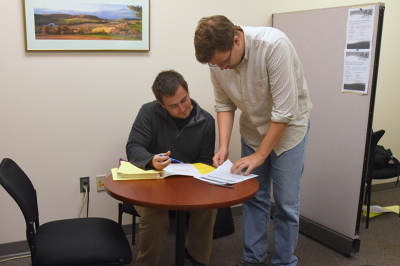 Social justice is a hard knocks business. Every week, the students of the Neighborhood Law Clinic throw open the doors of our office on Madison’s underdeveloped South Side and listen to tales of the trials and tribulations of some of the area’s poorest residents. The poor, it turns out, gain exposure to some of the ugliest and disheartening aspects of our society—whether it’s a woman who worked as a janitor for a month, only to be told that she would not be paid one cent, or a man whose rented home is quite literally collapsing around him. The range of hardships and petty injustices that proliferate among the most impoverished Madison communities is simply too overwhelming, exploitative landlords and employers too profligate. Sometimes we can help the clients who come through the door; more often, we cannot.
Social justice is a hard knocks business. Every week, the students of the Neighborhood Law Clinic throw open the doors of our office on Madison’s underdeveloped South Side and listen to tales of the trials and tribulations of some of the area’s poorest residents. The poor, it turns out, gain exposure to some of the ugliest and disheartening aspects of our society—whether it’s a woman who worked as a janitor for a month, only to be told that she would not be paid one cent, or a man whose rented home is quite literally collapsing around him. The range of hardships and petty injustices that proliferate among the most impoverished Madison communities is simply too overwhelming, exploitative landlords and employers too profligate. Sometimes we can help the clients who come through the door; more often, we cannot.
Telling a client that we cannot help is the most challenging and wrenching thing the students at the NLC must do. Since starting at the Clinic, my colleagues and I have had to tell tenants facing eviction that the Clinic cannot help them, tell unpaid workers that they must try to collect the wages owed to them without help. Last week, I had to tell a homeless woman that, because of a lack of resources, the Clinic would not be able to help her find a place to live. Even for young, idealistic students like us, at times like these it is hard to fight the temptation to feel a bit jaded.
Not so the clients. I am continually amazed at the perseverance and sociability of the people who come into our office. Although they often come bearing tales of iniquity and want, almost always they express nothing but gratitude and friendliness towards the Clinical students. They hold nothing back. They are open, gracious, and—essentially—generous. In one remarkable example, out of gratitude for the Clinic’s assistance, a client recently asked me if he could buy us students any schoolbooks. (I suspect he did not quite realize the magnitude of that offer, considering that the standard law school book publisher makes the worst slumlord look like Mother Teresa.)
But not only do our clients show appreciation to us—they also display an innate, almost unconscious sense of camaraderie with each other. At the end of every intake interview with a client, NLC students are trained to ask a simple question: “What are your goals for coming in today?” The answers returned by the clients rarely relate to their own hardships: they seldom ask just for money, or for revenge on an immoral landlord. Instead, clients usually respond with a variant of, “I just don’t want this to happen to anyone else.” Behind that simple statement is an undercurrent of solidarity, a sense that by fighting each small, frustrating, sometimes tragic battle, the community can improve, one tenant at a time. In my mind, this is the solidarity the NLC helps foment. And thinking of that makes it easier to take the hard knocks.

